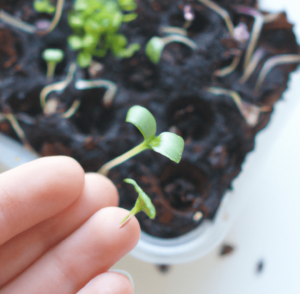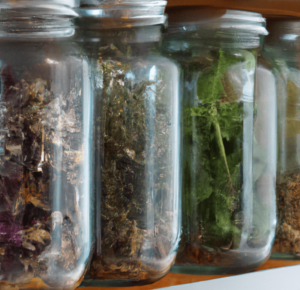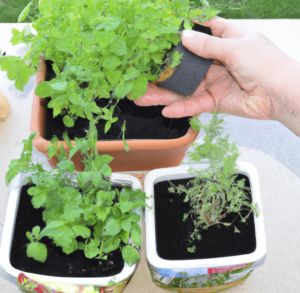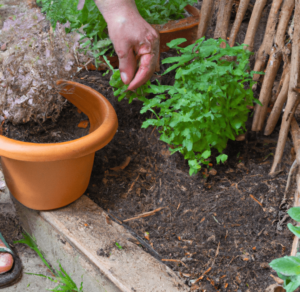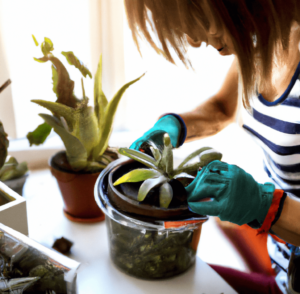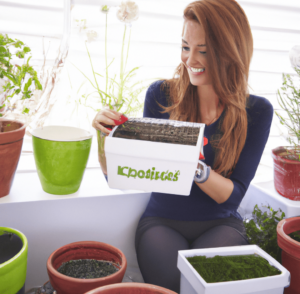Gardening is a rewarding and enjoyable hobby that can provide a sense of accomplishment, as well as a source of fresh produce. But can anyone become a good gardener? The answer is yes! While some may have a natural green thumb, with a little bit of knowledge and practice, anyone can learn how to successfully grow their own plants, flowers, and vegetables.
Soil is an essential element of gardening, as it provides the foundation for plant growth. It’s important to choose the right type of soil for your specific plants, as well as to ensure that it is well-draining and nutrient-rich.
The size and layout of your garden will also play a role in your success as a gardener. Consider the amount of sunlight and space available, as well as the specific needs of the plants you wish to grow.
Vegetable gardening can be especially rewarding, as it allows you to grow your own fresh produce right in your backyard. From tomatoes and peppers to carrots and lettuce, the options are endless.
With a little bit of planning and effort, anyone can become a successful gardener. It just takes a willingness to learn and a desire to get your hands dirty.

The Health Benefits of Gardening and Growing Vegetables
Gardening and growing your own vegetables can have numerous health benefits, both for your physical and mental well-being. For one, working in the soil has been shown to have a therapeutic effect on the mind. It can reduce stress, improve mood, and increase feelings of accomplishment and relaxation.
In terms of physical health, growing your own vegetables can provide numerous benefits. Fresh, homegrown vegetables are often more nutrient-dense than store-bought options, as they are picked at their peak ripeness and do not need to be transported long distances. Plus, gardening can provide a form of moderate physical activity, which can help to improve overall health and well-being.
Another added benefit of gardening is that it allows you to have more control over the quality and safety of your food. By growing your own vegetables, you can be sure that they are free from harmful chemicals and pesticides, which can be present in conventionally grown produce.
Overall, gardening and growing your own vegetables can have numerous positive impacts on your health, both physically and mentally.
Tools
There are many tools that are essential for gardening and working with vegetables. Some of these tools are designed for use by hand, while others are powered by electricity or other sources of energy. Here are a few examples of tools that may be useful for gardening and working with vegetables:
- Hand tools: These are tools that are designed to be used by hand, without the need for any additional power source. Examples include trowels, spades, hoes, and pruning shears.
- Garden tools: These are tools that are specifically designed for use in the garden, such as rakes, shovels, and hoses.
- Vegetable tools: These are tools that are specifically designed for use with vegetables, such as vegetable peelers, graters, and slicers.
- Metal tools: Many gardening and vegetable-related tools are made of metal, such as stainless steel or aluminum. These materials are strong and durable, and are resistant to corrosion and rust. Examples of metal tools include shears, pruners, and hoes.
Understanding Soil for Gardening
As a gardener, it is important to understand the characteristics and needs of the soil in your garden. The soil is the foundation for the growth of all plants, and providing the proper nutrients and conditions can lead to healthy and flourishing plants.
One way to ensure that your plants are getting the nutrients they need is through the use of chemical fertilizers. These fertilizers can provide a quick boost of specific nutrients to the soil, such as nitrogen, phosphorus, and potassium. However, it is important to use chemical fertilizers sparingly and according to the instructions, as overuse can harm the soil and plants.
In addition to using chemical fertilizers, there are other ways to improve the fertility and health of the soil in your garden. This can include adding organic matter, such as compost or mulch, which can help to improve the structure and nutrient content of the soil. Proper watering and drainage are also essential for the health of your plants and soil.
As a gardener, it is important to understand the needs of your specific plants and the characteristics of the soil in your garden. By taking the time to properly care for and nourish your soil, you can create a thriving and productive garden.
Food and Nutrition
Good nutrition is essential for maintaining a healthy body and mind. The nutrients found in food provide the energy and support necessary for the body to function properly.
Growing your own food, whether in a garden or on a windowsill, can be a great way to ensure that you have access to fresh, nutrient-rich produce. The sun is an important source of energy for plants, and can also provide vitamin D for humans when we spend time outdoors.
Incorporating a variety of whole, unprocessed foods into your diet can help you get the nutrients you need to support your health and well-being. Fruits, vegetables, whole grains, legumes, nuts, and seeds are all great choices for adding nutrition to your diet. It’s also important to pay attention to portion sizes and to choose foods that are low in added sugars, sodium, and unhealthy fats.

Indoor Gardening: Tips for Planting Vegetables
If you’re interested in starting an indoor gardening project, here are a few suggestions to consider:
- Choose a sunny location: Most vegetables need at least six hours of direct sunlight per day to thrive. If you don’t have a sunny spot in your home, consider using grow lights to supplement the natural light.
- Use the right soil: Vegetables need well-draining soil that is rich in nutrients. You can either purchase a potting mix specifically designed for vegetables or create your own by mixing equal parts compost, peat moss, and perlite.
- Select appropriate plants: Not all vegetables are well-suited for indoor gardening. Some easy options to try include herbs, lettuce, tomatoes, and peppers.
- Water regularly: Be sure to water your plants consistently, but be careful not to overwater. Overwatering can lead to root rot, which can be deadly for your plants.
- Fertilize as needed: Most vegetables will benefit from fertilization, but be sure to follow the recommended guidelines for the specific plant you are growing.
By following these tips, you’ll be well on your way to a successful indoor gardening project and a delicious harvest of fresh vegetables.
Beginner’s Guide to Gardening
If you’re new to gardening, it’s important to start with the basics. Here are a few suggestions to get you off the ground:
- Choose a suitable location for your garden. Consider factors such as sunlight, soil type, and access to water.
- Start small and work your way up. It’s easy to get overwhelmed with a large garden, so begin with a few plants and expand as you gain confidence and experience.
- Learn about the specific needs of the plants you want to grow. Different plants have different requirements for water, sunlight, and soil.
- Invest in some essential tools. A good set of gloves, a trowel, and a watering can will go a long way in helping you care for your garden.
- Don’t be afraid to ask for help. Gardening can be a rewarding hobby, but it can also be challenging at times. Don’t hesitate to reach out to experienced gardeners or local gardening groups for guidance and support.
Tips for Successful Gardening
- Start with high-quality soil and prepare the ground properly before planting. This may involve adding compost or other organic matter to improve soil structure and fertility.
- Choose the right plants for your climate and location. Consider factors such as sunlight, water availability, and soil type when selecting your plants.
- Use compost to enrich the soil and improve plant health. Composting is the process of breaking down organic matter, such as food scraps and yard waste, into a rich, soil-like material that can be used to nourish plants.
- Water your plants consistently and deeply. Proper watering is crucial for plant health and growth. Water your plants deeply and consistently to ensure they have a sufficient supply of moisture.
- Protect your plants from pests and diseases. Keep an eye out for any signs of problems and take steps to address them promptly. This may include using natural pest control methods or applying appropriate chemical treatments.
Improving Your Mental Health Through Gardening
Gardening can be a great way to improve your mental health, especially if you are feeling depressed or stressed. Not only does spending time outdoors have a calming effect on the mind, but the process of planting, nurturing, and harvesting plants can also be very therapeutic.
One way that gardening can help improve your mental health is by giving you a sense of accomplishment and purpose. Seeing your plants grow and thrive can be a source of pride and satisfaction, and the process of caring for them can give you a sense of responsibility and meaning.
Gardening can also be a great way to improve your physical health by providing you with an opportunity to get some exercise and fresh air. Additionally, growing your own fruits and vegetables can help you eat a more healthy diet by providing you with fresh, nutrient-rich produce.
By improving the soil in your garden, you can also improve the health of your plants. This can involve adding compost or other organic matter to the soil to improve its structure and fertility. You can also use natural pest control methods, such as planting herbs or flowers that attract beneficial insects, to keep your plants healthy.
Overall, gardening can be a great way to improve your mental and physical health, as well as the health of your soil and the plants you grow.
The Mental Health Benefits of Gardening
Gardening can be a wonderful activity for both the body and the mind. Not only does it allow us to get outside and engage in physical activity, but it also provides numerous mental health benefits.
One of the main benefits of gardening is the sense of accomplishment and pride that comes from growing and caring for plants. Whether you are growing herbs, vegetables, or flowers, the act of nurturing and watching something grow can be incredibly fulfilling.
Gardening can also be a great way to de-stress and unwind after a long day. The repetitive actions of planting, watering, and tending to a garden can have a meditative quality, helping to clear the mind and calm the senses.
In addition to the stress-reducing effects of gardening, it can also provide a sense of purpose and meaning. When we take the time to care for our garden, we are also taking care of ourselves and our environment. This sense of purpose can be especially important for those who are struggling with mental health issues, as it can provide a sense of direction and focus.
Overall, gardening can be a wonderful activity for both the body and the mind, providing numerous benefits for our mental health and well-being. Whether you have a small balcony garden or a sprawling backyard, taking the time to tend to a garden can be a rewarding and therapeutic experience.
Growing Vegetables in Your Garden: Tips for the Novice Gardener
If you’re new to gardening and want to start growing your own vegetables, here are a few tips to keep in mind:
- Choose the right location: Make sure you choose an area of your yard that gets plenty of sunlight. Most vegetables need at least six hours of direct sunlight per day to thrive.
- Prepare the soil: Before planting, be sure to till the soil and add compost or organic matter to help enrich it. This will give your plants the nutrients they need to grow strong and healthy.
- Choose the right plants: Consider the space you have available and choose vegetables that will thrive in your garden. Some good options for beginners include tomatoes, lettuce, peppers, and beans.
- Water regularly: Make sure to keep your plants well-watered, but be careful not to overwater them. Overwatering can lead to root rot and other problems.
- Keep an eye on pests: Keep an eye out for pests such as aphids or slugs, and take steps to control them if necessary. This can help ensure that your plants stay healthy and produce a good yield.
Remember to have fun and be patient as you learn the ropes of gardening. With a little practice and attention, you’ll be well on your way to growing a thriving vegetable garden.
Bottom Line: Anyone Can Become Good at Gardening
Yes, anyone can become a good gardener with the right attitude and approach. Gardening can be a rewarding and therapeutic hobby that can be enjoyed by people of all ages and skill levels. To become a good gardener, it’s important to start by learning the basics, such as choosing the right plants for your climate and soil type, proper watering techniques, and how to care for and maintain your plants. It’s also helpful to be patient and persistent, as gardening can require trial and error. By seeking out information and resources, asking for help, and being willing to learn and adapt, anyone can develop the skills and knowledge needed to become a successful gardener.
If you’re interested in can anyone become good at gardening, you may also be interested in what gender is most popular for gardening and what factors make someone good at gardening.


